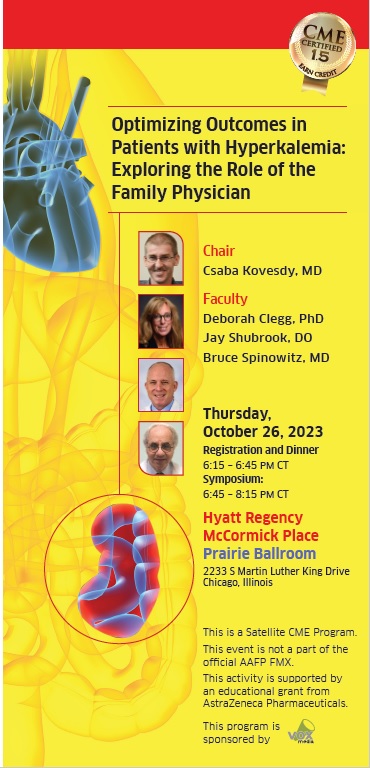 |
Registration and Dinner: 6:15 – 6:45 pm CT Registration for this program is now closed. |
|
Program Overview:
There is a need for family physician awareness of the importance of potassium (K+) balance and of the multiple causes and consequences of hyperkalemia. There is an increased risk for hyperkalemia in vulnerable patients that family physicians commonly treat, such as those with chronic kidney disease (CKD), diabetes and heart failure (HF); many of these patients receive renin-angiotensin-aldosterone inhibitors (RAASi). It is essential that family physicians have an appreciation of the benefit/ risk profile of RAASi, specifically their cardiovascular (CV) and renal benefits, as well as an awareness of the need to maintain patients on these agents and preferably at target doses. Restricting dietary K+ intake is used as a core intervention for prevention and treatment of hyperkalemia; however, recent evidence has called this strategy into question, and clinicians need to be updated with current expert opinion to subsequently disseminate this information to patients. Furthermore, it is important for family physicians to receive education on new K+ binders which not only effectively treat hyperkalemia, but also enable patients to continue with RAASi therapy. Interpreting data with new K+ binders is critical to facilitate implementation of treatment plans with these agents. Another population at high risk are patients with end-stage renal disease (ESRD); ESRD patients have severely reduced renal K+ excretion and require hemodialysis and peritoneal dialysis to maintain normal serum K+. Despite dialysis, many patients have persistent predialysis hyperkalemia, a potentially life-threatening condition associated with cardiac arrhythmias and death. K+ binder therapy has been shown to be an effective, well-tolerated treatment for predialysis hyperkalemia. In this program, experts will discuss the risk factors for, and risks of hyperkalemia, treatment goals of acute and chronic hyperkalemia, the importance of RAASi in CKD and HF patients, the potential adverse outcomes in individuals with ESRD undergoing adequate hemodialysis with predialysis hyperkalemia, and evidence with K+ binders in various patient populations. A multi-specialty faculty, consisting of two nephrologists, a dietician, and a primary care physician, will then discuss cardiorenal challenges faced by family physicians, including dietary recommendations to their patients with hyperkalemia. In addition, the panel will identify key cardiorenal messages for patients taking K+ binders (for hyperkalemia) and sodium-glucose cotransporter 2 (SGLT2) inhibitors which reduce the risk for hyperkalemia and significantly improve cardiorenal outcomes. |
|
|
Educational Objectives:
Accreditation & Credit Designation:
| |

